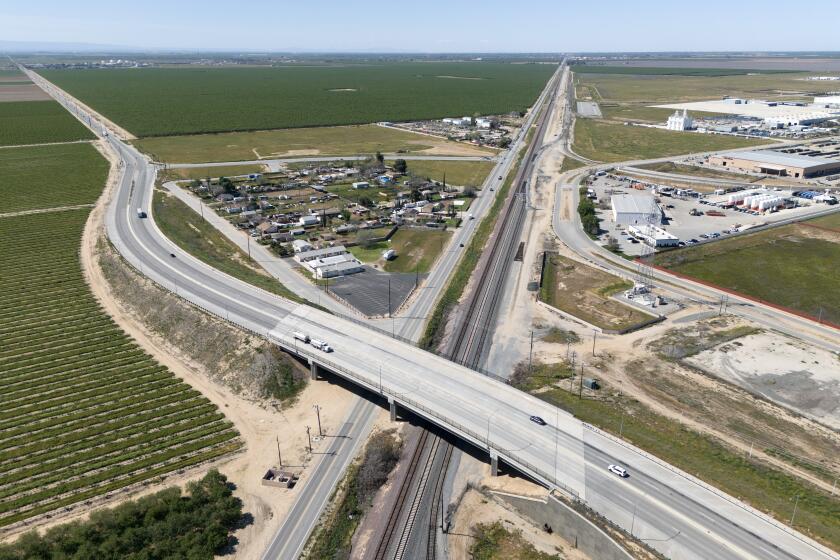Car-rental fees need more disclosure
Scott Baggett traveled from California to Hawaii recently. While on the islands, he rented a car from Hertz.
Baggett, 38, had thought he’d be paying $17.95 a day for his wheels. The actual charge, once all the taxes and fees were piled on, came to $32.95. That’s nearly double the advertised price.
“This practice is deceptive and unfair,” Baggett told me. “Plain and simple.”
Well, it’s plain that hiding extra charges is deceptive and unfair. Yet this is anything but simple.
Many of the fees on your rental-car contract are imposed not by Hertz or Avis but by state and municipal authorities looking to raise a little extra cash — and the rental firms don’t like them either.
“We’re enormously frustrated,” said Bob Barton, president of the American Car Rental Assn., an industry group. “It’s impossible to disclose all the different fees that we have to collect for various municipalities.”
There are two issues here, both related. The first, as Baggett observed, is the fact that the final cost of renting a car is typically far different from the advertised price.
The initial price doesn’t include surcharges for fees paid to airports and hotels, or for gas costs, or vehicle licensing. The websites of all major car-rental firms don’t even disclose that such fees exist until you’re deep into the booking process.
“It makes it incredibly hard to comparison shop,” Baggett said.
No less nettlesome, though, is the practice of towns and cities tacking on extra fees for local projects — fees that will be paid almost exclusively by out-of-towners who have no say over the political futures of the people who imposed the levies.
“I can’t tell you the number of baseball stadiums, football stadiums and hockey arenas that our customers have built across the country,” Barton at the rental-car association said. “We are constantly trying to protect our customers from being a tax fund for municipalities where they don’t live.”
Rich Broome, a Hertz spokesman, acknowledged that disclosure of all the taxes and fees for a rental car doesn’t come until a customer has reached the end of the booking process.
He said that because surcharges can vary widely from place to place, it would be impossible to break things down for customers in advance.
I disagree. Although it would be difficult to give people an accurate estimate of all taxes and fees before details of a booking are in place, at the very least rental-car firms can introduce greater transparency to their pricing.
By that, I mean they could make it much clearer that advertised prices in no way reflect final prices.
In April, the Department of Transportation required that airlines do a better job of disclosing all the extra fees that can be added to advertised prices. “Airline passengers have a right to be treated fairly,” Transportation Secretary Ray LaHood said.
So do car renters. That’s why rental agencies should be required to feature prominent links on their websites to a breakdown of the various taxes and fees that can find their way onto customers’ bills.
I don’t need to know how much every fee will run me. But if there might be an “airport concession fee recovery charge” or a state tourism fee, I want to know that.
As for the onerous charges slapped onto rental-car contracts by municipalities, I’m with the industry on this one. It hardly seems fair to make people who won’t enjoy the benefits of a local project foot the bill for its construction.
Politically speaking, that’s about as cowardly a way as I can think of to boost the local economy. If a new football stadium is on the line, say, let locals cover the costs through higher taxes or bonds. And let local politicians feel local voters’ wrath if they don’t like such plans.
In July, Rep. Steve Cohen (D-Tenn.) introduced the End Discriminatory State Taxes for Automobile Renters Act (H.R. 2469). It would prohibit state and local governments from adding taxes exclusively to rental-car agreements.
Similar laws are already in place for the airline, rail, bus and trucking industries.
Fair is fair. Plain and simple.
A fee to get cash
Speaking of under-the-radar fees, Lal Akatrai wants to know why Chase bank charged him a $15 “wire fee” to receive money wired into his checking account.
“I can understand a fee to send money,” he told me. “The teller has to do some work. But receiving? That’s basically computer to computer.”
Good point. And even by the petty nickel-and-dime standards of most bank fees, isn’t $15 a bit on the high side for something that doesn’t cost the bank a thing? It was the bank that sent the funds, after all, that had to do all the work.
Akatrai, 69, is a Long Beach commercial real estate broker. He had a client wire him his commission to expedite a recent sale.
Gary Kishner, a Chase spokesman, declined to comment on whether the bank has to do anything to receive a wire transfer other than keep its computers running. “We don’t publicly discuss the processes behind our services,” he said.
Kishner called the receipt of wired money “a convenience offered to our customers.”
Call me old fashioned, but isn’t putting money into people’s accounts what banks do for a living? Moreover, isn’t that money generally considered a good thing because banks get to play with it until customers want it back?
Sarcasm alert: Sure is a good thing that Republican lawmakers have put the kibosh on appointing a director for the new Consumer Financial Protection Bureau. I can’t imagine why we’d want more oversight of banks.
David Lazarus’ column runs Tuesdays and Fridays. He also can be seen daily on KTLA-TV Channel 5. Send your tips or feedback to david.lazarus@latimes.com.







